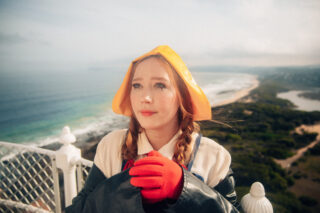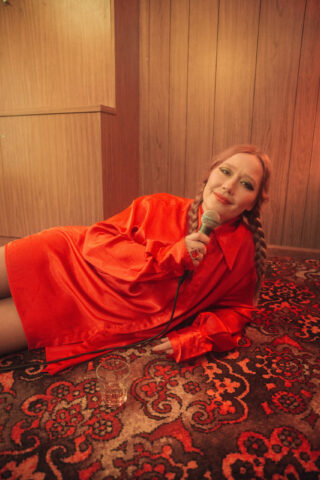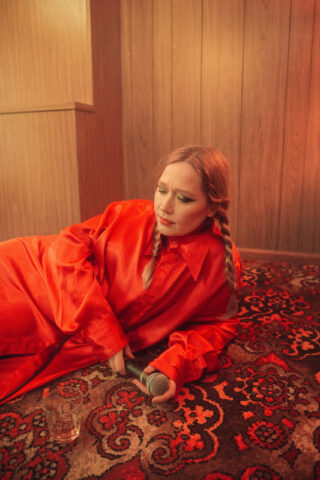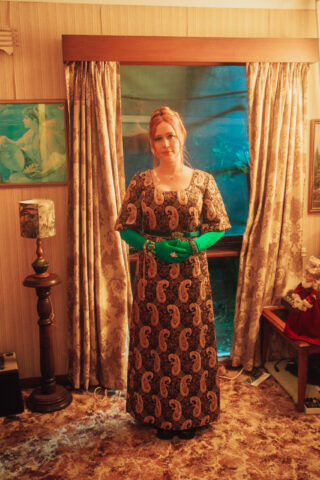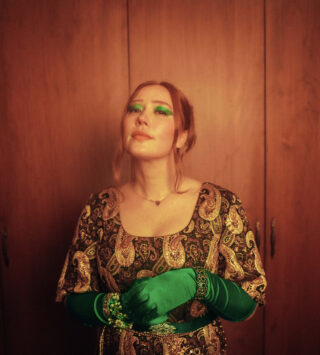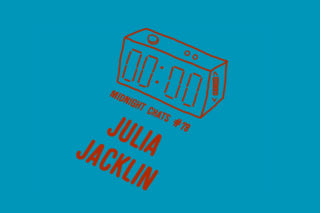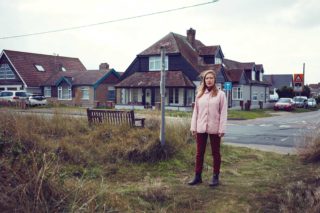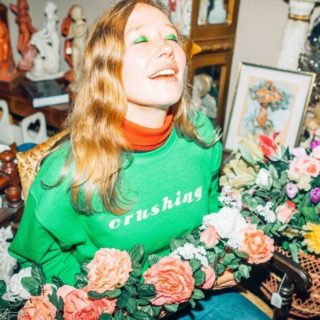PRE PLEASURE was recorded in Montreal in a similar manner to Don’t Let The Kids Win and Crushing, which is to say it was completely different. With every new record, Jacklin chooses a new producer and a new location, books the studio far in advance and then prays she’ll have an album ready to go by the time she gets there. She never does, but she always has some of it. She spent two weeks in an apartment in Toronto, “in a fever dream of stress… but it was beautiful. I was trying to pull together all of my ideas,” she says, “as much as I could.” She blu-tacked reams of butcher paper to the walls, covered in lyrics and ideas. Once recording had begun, when she’d run out of songs she would write in her apartment at night again and bring something new in the following day, to work on with her Canada-based live band. It was the first time she wrote not on guitar but a Roland keyboard, enjoying the sparseness of simple chords and its built-in backing tracks.
She says: “The biggest thing was I wanted it to sound more joyful than my last record. I wanted it to feel a little less heavy. I wanted to make some music that was going to make me feel some sort of joy. Crushing was sad to play every night for two years. Just for myself, and for the crowd, I wanted some more generous sounding music to throw into the set.” She pauses. “Yeah, that’s the main word – generous.
“But I knew the lyrics were always going to be what they were – I wasn’t going to write joyful lyrics because I don’t know how to do that yet… or, no, it’s just not my style. But I was trying very hard to explain to everyone that the album retained dry vocals and scrappy elements but had more pop sensibilities. Constantly keeping that in mind whenever the record started to go sad words sad music.” She raises her arm up and slants it downwards. “I think I achieved it on 75% of the album,” she estimates with a laugh.
It’s a throwaway percentage that feels somewhat true: of PRE PLEASURE’s ten tracks, its two most minimal and slow, ‘Too In Love To Die’ and ‘Less of a Stranger’, pack similar gut punches to those found across Crushing. The remaining 5% is for fans to debate, as I’m sure they will.
Elsewhere, as Julia says, she’s kept a lightness of touch in the music, turning a song about young, vulnerable sex into a sparkly glitter ball moment on ‘Ignore Tenderness’, giving us unmistakeable grunge pop on ‘I Was Neon’ and revelling in quiet-loud-quiet joy on ‘Love, Try Not to Let Go’ – a song about an overwhelming desire for love that’s echoed in the rushes of distortion, which definitely weren’t on offer the last time you saw Julia Jacklin live. Even ‘Magic’ – another exploration into what sex is really like for most of us – peaks triumphantly after a spidery, skewed guitar opening that sounds like ‘Heroin’ by the Velvet Underground.
“I wanted to sing about relationships in my life and make it very obvious that it wasn’t romantic,” says Julia. “That’s something I’ve written about in the past but those relationships are a lot harder to write about. And it’s hard to make it clear that they aren’t romantic songs. I think familial platonic relationships and sex were two things I was exploring at the time with songwriting. But I guess it’s just what was going on.”
Crushing had a couple of these songs too, but they largely got swept up in the breakup album narrative. ‘When The Family Flies In’ could be (and often was) read as mates being supportive after the end of a relationship, but it was actually about a close friend of Julia’s dying of cancer; ‘You Were Right’ was a message to an ex, but it was for an ex-friend, not an ex as we tend to know them in pop music.
“Friendship breakdowns are so intense in a way that’s hard to write about because we don’t have much language around it, and we don’t have much ceremony,” Julia says, noting that she called the final track on the new album ‘End of a Friendship’ to avoid any confusion around what it’s about. It’s a perfect closer; the Twin Peaks score with an orchestral arrangement from Arcade Fire’s Owen Pallett. “I feel like the world would be slightly nicer if we broke up with our friends,” says Julia. “I feel like people are slightly haunted by old friendships because there is no closure.”




